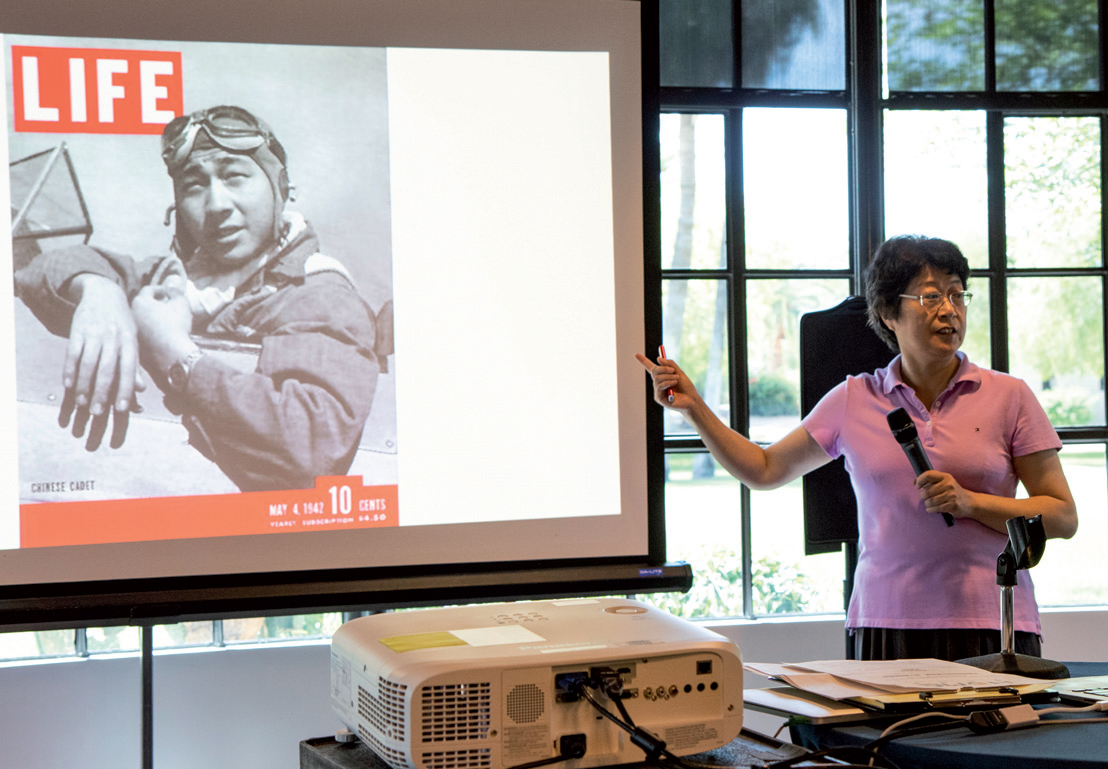WWII pilot families lovingly resurrect lost lives


Paying homage
Feng was one member of several Chinese families that traveled to El Paso from China and the US to pay homage to their long-lost loved ones.
Scores of Chinese Air Force pilots died in training in the US during WWII and their burial places remained unknown to their families for more than seven decades.
The journey was started by Ann Lee, a Canadian-Chinese writer and historian who lives in the US. Her uncle Lee Chia-Ho, like Van, died in an airplane accident in 1944.
When Lee's family first discovered her uncle's grave at Fort Bliss National Cemetery in El Paso in 2012, they noticed that many neighboring headstones also bore Chinese names.
Lee's brother tried but failed to get more information about them. Lee persisted.
"I went to El Paso in March 2018 with my husband and counted a total of 52 Chinese pilots buried there. I was shocked, as well as moved. I decided to make it my fulltime job to find out all I could about them," said Lee.
Her investigation led her here and there and eventually she got some concrete information.
"From October 1941, when the first group of Chinese Air Force cadets went to the US for training, the United Stated trained 866 Chinese pilots. A total of 3,553 Chinese citizens had undergone various trainings related to the Air Force in the US," Lee said.
Lee learned that 57 Chinese cadets and pilot instructors died in the US during their training. Besides the 52 buried in El Paso, another five are buried in Atlanta.
According to Fuller, about 30,000 pilots of the US Army Air Force died in combat in the European Theater during WWII. In the US, roughly 15,000 pilots died in training. Flying was a much riskier business back then, he explained.
"Aviation was still in its infancy at that time, there were still a lot of things that needed to be learned, like flying at night. Instruments were not reliable like today," Fuller said.
Lee went to China and got help from the Hunan Longyue Center for Peace and Public Welfare Development and various media outlets. Within a year, they found families of more than 20 pilots.
Organized by the Longyue Center, over a dozen family members of eight Chinese pilots made a pilgrimage to Fort Bliss on May 11.
On May 12, they held a memorial for the 52 Chinese pilots buried in this faraway land for more than 70 years unbeknownst to their families. Fort Bliss National Cemetery lowered its flag to half mast to honor the occasion.
Feng placed two photos of his mother – Van's sister – in front of his headstone. One photo shows Van's sister as young girl at the time of Feng's departure to the US, another shows her at 96 years old.
"My mom is 96. She made the request to me to find her brother in 2000. I am happy we finally located him last year. She loves her older brother and misses him greatly. Now I 'brought her' to see him. I am happy I fulfilled my mom's wish," Feng said.
Feng also brought a photo of Van taken in Phoenix during the war. It was a memento given by Van to Chinese pilot Zhou Yaoting upon his graduation. Zhou went back to China and died in combat in May 1945. Zhou's son gave it to Feng when they finally connected a few months ago.
Li Shihua came to see his uncle Lee Yei-Chang's grave. Prior to the trip, Li learned that the name was spelled wrong by one letter. It was replaced with a new tombstone — with the spelling corrected — by the cemetery prior to his visit.
"Uncle, I finally found you. You can rest in peace now that they fixed your name," said Li, standing at the headstone.
"All of the tombstones are well maintained, and my uncle is kept company by many of his comrades. I am very comforted by this. I feel very appreciative to the cemetery staff for taking such good care of them," said Li.
When Hu Hanying and her son Chen Xi finally located the headstone of Lu Ju-Hsiang, they cried.
"I grew up with my grandma who talked about my uncle all the time. She died at 96 and asked us to find her son," said Hu.
"We brought with us wishes of three generations. My mom was 19 when her brother died. A month before his death, he wrote home saying that there were beautiful fabrics in the US for making qibao and asked my mother what color she would like."
Hu and Chen video chatted from the headstone with Lu's sister, who is now 94 and lives in China. "It's bittersweet, we are sad but we are also happy we found him. He has always lived in our hearts," said Hu.
























